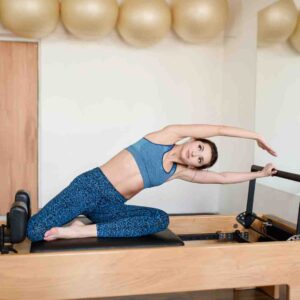Table of Contents
Introduction
Pilates Benefits: 5 Reasons
Pilates Injury Prevention and Rehabilitation
Pilates for Posture and Well-Being
Q&A
Conclusion
"Pilates strengthens body and mind."
Introduction
Pilates improves posture, core strength, and flexibility. It involves mat or equipment-based controlled movements. Pilates helps enhance balance, stress, and physical pain, making it a popular workout option. However, goals and needs determine if Pilates is necessary for everyone.
Pilates Benefits: 5 Reasons
Pilates is a century-old exercise. Joseph Pilates developed it, believing physical and mental health were linked. Pilates is a low-impact workout that builds core strength, flexibility, and body awareness. Pilates is beneficial for several reasons, despite what some may assume.
Pilates improves posture. Poor posture can result from long hours at a desk or computer. Pilates strengthens spine-supporting muscles, improving posture and reducing back discomfort. Pilates emphasises perfect alignment and body awareness, which can improve your posture throughout the day.
Pilates is low-impact and joint-friendly. Pilates is low-impact, unlike jogging or leaping. It's wonderful for joint discomfort and injuries. Pilates is adaptable to most fitness levels and abilities.
Pilates increases flexibility and range of motion. Pilates exercises stretch and lengthen muscles, improving flexibility and range of motion. Tight muscles or reduced movement can benefit from this. Flexibility can lessen injury risk during other exercises and daily activities.
Pilates enhances balance and coordination. Pilates activities that demand balance and control can enhance balance and coordination. This is especially helpful for elderly persons, who may be more likely to stumble due to balance and coordination issues.
Pilates reduces stress and boosts mental health. Pilates promotes relaxation by focusing on breathing and awareness. Pilates improves bodily awareness and self-confidence, which benefits mental health.
Pilates has various physical and mental health benefits. It can improve posture, alleviate joint pain, increase flexibility, balance, and coordination, and reduce stress. Pilates is perfect for anyone who want a low-impact workout that improves fitness and well-being. Find a trained Pilates instructor to coach you through the exercises and ensure perfect form and technique.
Pilates Injury Prevention and Rehabilitation
Pilates has become popular due to its many benefits. This low-impact workout strengthens core muscles, improves flexibility, and raises body awareness. Pilates is essential for injury prevention and rehabilitation, despite its perceived optionality.
Pilates helps avoid injuries. Pilates strengthens core muscles to enhance posture and balance, reducing falls and other mishaps. By correcting muscle imbalances and movement patterns, Pilates helps avoid overuse injuries. Athletes and repetitive exercisers like runners and cyclists need this.
Pilates prevents and rehabilitates injuries. Back discomfort and arthritis sufferers can modify Pilates movements. Pilates is a safe and effective exercise for people who can't run or use weights.
Pilates can also help post-surgery patients recover. Pilates improves range of motion, reduces discomfort, and boosts physical function. This can help orthopaedic surgery patients recuperate.
Pilates enhances physical function. Pilates improves core strength, flexibility, and balance, which boosts performance. This can help sportspeople improve.
Pilates can cross-train runners and weightlifters. Pilates improves physical function and reduces injury risk.
Pilates is essential for injury prevention and recovery. Its low-impact nature, focus on core strength and flexibility, and ability to be modified for injuries or chronic problems make it a safe and effective workout for all ages and fitness levels. Pilates can help you reach your fitness objectives and improve your physical function, whether you are an athlete or recovering from surgery.
Pilates for Posture and Well-Being
Pilates is growing popularity. This low-impact workout strengthens core muscles, improves flexibility, and raises body awareness. Pilates may seem like an unneeded addition to your exercise programme, yet it has several benefits.
Pilates is great for posture. Poor posture causes back, neck, and headaches. Pilates strengthens spine-supporting muscles to rectify postural abnormalities. Pilates can enhance alignment, balance, posture, and discomfort.
Pilates improves posture and well-being. Focusing on breath and movement, the practise emphasises mind-body connection. This reduces tension, anxiety, and brain fog. Pilates can boost energy and sleep quality by releasing stress and relaxing.
Pilates is flexible. Pilates is accessible to most people since it can be adapted to various fitness levels. Pilates may challenge and benefit athletes of all levels. Pilates can be done in studios, gyms, and at home. It's easy and adaptable for busy people with restricted exercise facility access.
Pilates can enhance your exercise programme, but not everyone needs it. Pilates can help you improve your posture, well-being, or try something new. Pilates improves strength, flexibility, and body awareness, making you feel better physically and emotionally.
Find a certified Pilates instructor if you want to try it. Find a qualified Pilates instructor with experience teaching all fitness levels. Tell your teacher about any injuries or health issues so they can alter activities for you.
In conclusion, Pilates may not be for everyone, but regular practise has many benefits. Pilates improves strength, flexibility, posture, and well-being. Find a certified instructor if you want to attempt Pilates. Pilates offers several benefits if practised regularly.

Q&A
1. Does fitness require Pilates?
Answer: Pilates is not necessary for fitness but can enhance a programme.
Pilates for weight loss?
Answer: Pilates can boost muscular tone and body composition, but it should be paired with a good diet and cardio.
3. Is Pilates for everyone?
Answer: Pilates can be customised for different fitness levels and physical abilities, but you should visit a competent instructor before starting a Pilates programme, especially if you have injuries or medical concerns.
Conclusion
Conclusion: Pilates improves flexibility, strength, and posture. However, some medical issues may make it unnecessary. Before commencing an exercise programme, visit a doctor.


